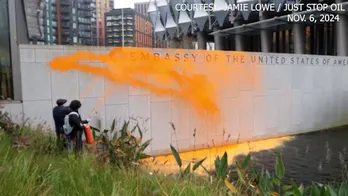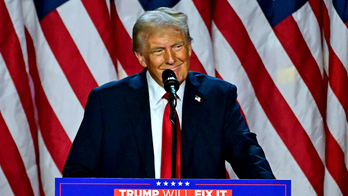After Vietnam, the Philippines could be next to ban 'Barbie.' Here's why
MANILA, Philippines — Who knew the next kerfuffle over the longtime territorial dispute between China and its Southeast Asian neighbors over the South China Sea would be so... PINK?
The upcoming Barbie movie by Warner Bros. has not even hit theaters yet and a second Southeast Asian nation may ban it from being shown because of a scene that includes a map that appears to depict a controversial nine-dash line — the U-shaped contour China uses on maps where it lays disputed claim to nearly all of the South China Sea.
Many of Beijing's neighbors in and around the South China Sea say these claims threaten their sovereignty.
Warner Bros. says the map is a "child-like" doodle that wasn't intended to make a statement.
On Tuesday, the Philippines' Movie and Television Review and Classification Board posted a notice confirming that the Barbie movie was under review. The film regulator did not say why the movie was being reviewed, nor did it say when a decision to allow it to be showed in theaters across the country would be rendered.
The movie was supposed to hit theaters across the Philippines on July 19.
The review comes on the heels of Philippine Sen. Francis Tolentino urging that the film regulator block the movie over its map. He told CNN Philippines that to screen the film domestically would denigrate Philippine sovereignty.
"This will not just be injurious to the Republic of the Philippines, but it would be contrary to what our country fought for and achieved under the Arbitral Ruling in 2016," Tolentino said, mentioning the decision by the Hague's Permanent Court of Arbitration that rejected China's expansive claims in the South China Sea, saying they had no basis in international law.
However, Beijing has ignored that ruling and continues to build artificial islands and patrol large swaths of the crucial waterway — angering neighboring countries.
Earlier this week, Vietnam's National Film Evaluation Council banned all domestic screenings of Barbie over the map that included the nine-dash line. The move puts Barbie on a growing list of films banned in Vietnam, including DreamWorks' 2019 animated film Abominable, Sony's 2022 film Uncharted, and the 2021 Australian spy movie Pine Gap.
The map in question is shown in the movie's main trailer. It appears briefly in a scene when Barbie, played by Margot Robbie, goes to another Barbie's house to seek help for her existential crisis. In that house is a brightly colored world map that appears to show the nine-dash line protruding from the east coast of the Asian continent, presumably China.
Warner Bros. has not responded to a request for comment from NPR. But in a statement to Reuters, the movie studio defended its use of the map.
"The map in Barbie Land is a whimsical, child-like crayon drawing," Warner Bros. told the news agency. "The doodles depict Barbie's make-believe journey from Barbie Land to the real world. It was not intended to make any type of statement."
Philippine military historian Jose Antonio Custodio says showing the nine-dash line is "crass capitalism" because even though it would be favorable to Beijing, it's very insulting to everyone else.
"Because precisely it legitimizes China's illegal claims on the entire South China Sea, which not one government around the world supports," he told NPR. "Most specifically, the United States itself. So to have an American company legitimize what the Chinese are doing is patently outrageous."
While Sen. Tolentino has floated the idea of a compromise that could come in the form of editing the map out, such a move could risk angering China "where Barbie has already been approved for a release and is expected to earn far more than it does in Southeast Asia," reports The Hollywood Reporter. However, the outlet said, Vietnam and the Philippines aren't negligible markets, where a Hollywood hit "can earn anywhere from $5 million to over $10 million in each country."
Custodio says "it's not unthinkable that the Philippines may actually end up banning the movie, just like Vietnam did."
Disclaimer: The copyright of this article belongs to the original author. Reposting this article is solely for the purpose of information dissemination and does not constitute any investment advice. If there is any infringement, please contact us immediately. We will make corrections or deletions as necessary. Thank you.







